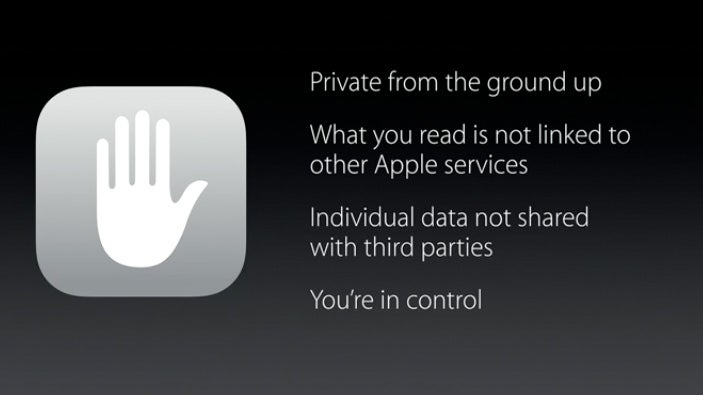“We don’t want your data” – How Apple differs from Google

At WWDC 2015, Apple gave a finger-wagging telling-off to unnamed third parties that farm and use personal data. We know who they mean, though. Facebook, Twitter and, above all, Google.
During WWDC’s opening keynote Apple showed us OS X El Capitan, iOS 9, native Apple Watch apps and a whole lot more, but one of the areas that VP of Software Engineering, Craig Federighi, pointedly focused on was the privacy of user data – not once, but twice.
“There’s more we wanted to do: adding intelligence throughout the user experience… without compromising your privacy.”
It follows Apple CEO Tim Cook just last week saying:
“You might like these so-called free services, but we don’t think they’re worth having your email, your search history and now even your family photos data mined and sold off for God knows what advertising purpose,”
Yes, it’s a little rich for Tim to say. Just last year one of the most high-profile lapses in personal data security happened and it all came from Apple’s iCloud. Thousands of personal and intimate photos were laid bare for all to see.
Apple announced two-factor authentication to help stop this happening again, but that’s not the point. What we’re talking about here is all that data that you create every day – contacts, emails, texts, search history, location, photos. Your life.
Apple claims all this information remains anonymous, and only available on your device. “It stays on your device, under your control,” said Federighi. It’s not connected with your Apple ID, or any other Apple services for that matter.
So how different is this to what Google does? Fundamentally so. Apple earns its money by selling you shiny new pieces of tech, while Google’s business model is totally different.
“We don’t mine your email, your photos or your contacts. Why would you do that?” Federighi emphasised when talking about OS X and iOS 9.
Google knows why. It’s become one of the biggest companies in the world by using the huge amounts of data it’s accrued and selling it to interested third parties. That’s your data I’m talking about, and lots of it. The old not-so-old adage “
Is that so bad, though? So you get some targeted ads, hell you might even see some offers that are more meaningful to you than the random ads that pop up while browsing your favourite sites.
If that’s as far as it goes then there’s not a huge amount to complain about. But sadly it can go further.
You see Apple states that the data it captures isn’t connected to you, what you do on your iPhone 6 isn’t associated with your name or personal details – it’s anonymous. Since it’s anonymous third parties, like governments, can’t subpoena for information or, worse, tap into the data secretly. That’s a massive temptation to invade privacy, for whatever reason, that can’t be done efficiently or effectively on Apple products.
There were four bullet points to Apple’s slide about privacy.
- Private from the ground up
- What you read is not linked to other Apple services
- Individual data not shared with third parties
- You’re in control
Whether you care about them at all depends entirely on how much you value your data. Devices running Google’s operating systems tend to be a lot cheaper than their iOS or OS X counterparts. For many that’s the big draw – the potential for their data being misused is just some cynic’s dystopian vision of the future.
But this shouldn’t be dismissed as the fanciful musings of the tin-foil-hat brigade. Plenty of leaks over the last few years show just how interested governments are in our personal data. And new phone and tablet manufacturers have sprung up that take privacy very seriously, whether that’s Silent Circle and it’s secure Android devices or Jolla and it’s very own operating system, Sailfish.
90% of the world’s data has been generated over the last few years, and the pace of data creation is growing. It’s time for all of us to be a little more concerned by how it’s being used.


